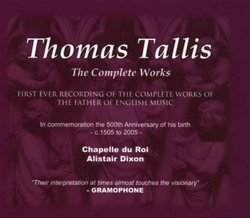| All Artists: Robert Evans, Edward Wickham, Graham Trew, Ben Davis, Sam Evans, Andrew Hope, Thomas [Composer] Tallis, Gregorian Chant, William [Composer] Byrd, Alistair Dixon, Stephen Taylor, Chapelle du Roi, Charivari Agreable, Laurence Cummings, Andrew Benson-Wilson, Andrew Wilson, Lisa Beckley, Alicia Carroll, Natalie Clifton-Griffith, Andrea Brown Title: Thomas Tallis: The Complete Works (Box Set) Members Wishing: 1 Total Copies: 0 Label: Signum UK Release Date: 1/25/2005 Album Type: Box set, Import Genre: Classical Styles: Opera & Classical Vocal, Chamber Music, Historical Periods, Classical (c.1770-1830), Early Music, Sacred & Religious Number of Discs: 10 SwapaCD Credits: 10 UPC: 635212006023 |
Search - Robert Evans, Edward Wickham, Graham Trew :: Thomas Tallis: The Complete Works (Box Set)
 | Robert Evans, Edward Wickham, Graham Trew Thomas Tallis: The Complete Works (Box Set) Genre: Classical |
Larger Image |
CD Details |
CD ReviewsWonderful Set, but why pay this much? Paul Schleuse | NYC & Binghamton, NY | 07/29/2005 (5 out of 5 stars) "This is a landmark set: the complete works of one of the most important composers of the 16th century, in performances of grace and clarity. However, you can get it for less than half of the US price by buying it at Amazon.co.uk. At GBP65.20, it works out to just over $100, or about $10 per disc--quite a bargain on a major addition to any serious early-music collection." Go To Amazon.com/uk Stephen H. Prosser | Boston, MA | 02/22/2006 (5 out of 5 stars) "Thank you Paul Schleuse. Your review is right on, and most importantly, I paid $113. (including shipping) from amazon.com/uk to Boston. Less than halk the price here." Surprisingly Excellent Singing... Giordano Bruno | Wherever I am, I am. | 02/23/2010 (5 out of 5 stars) "... and yet I don't know why I should surprised. I hadn't ever heard the Chapelle du Roi. I didn't know much about its director, Alistair Dixon. I confess that I expected nothing better than another mellifluous but murky British choral performance, with too many singers on a part and too little sense of the rhythmic independence from the conductor's baton that's required for pre-1600 polyphony. I humbly apologize for my prejudice; this is a stunningly rich and insightful performance by first-rate singers. This recording project began in 1997 and continued for quite a few years. I wish I'd heard it sooner. I have to thank one of my "friends" here in the amazoo for bringing it to my attention. I've only had time so far to listen to the first and last CDs of the set, so i may need to add or subtract from this review eventually.
Thomas Tallis (1510-1585) spent a good deal of his career in various small monasteries, where he was usually identified as an organist. It's doubtful that he ever commanded any large forces of singers, and it's obvious to the ears -- my ears at least -- that his music requires the expressive flexibility of one-on-a-part or at most two-on-a-part singing. That's what the Chapelle du Roi offers, with ten then-young singers in all. The superius parts are sung by women sopranos, and that is certainly an issue of authenticity, but the three women of the consort sing with a resoectful sense of total ensemble, and blend well with the lower men's voices, both in style and in timbre. One point of excellence is the 'forward' timbre of the tenor voices; they are never treated as mere 'inner' harmonizers, and since this music is plainly constructed around the "tenor" line, this is how it should sound. All of the previous reviews have focused on the price. Lucky me, I bought the last and only modestly-priced 'used' set. However, there are any number of other releases of exactly the same performance available here via amazon's alternate sellers, and there seem to be other supliers offering the set for better prices. Shop carefully. Postscript, less than a day later: I've just listened to V 8 of the set, which features two "Lamentations" from Jeremiah and ten simpler 'contrafacta", i.e. motets based on Psalms but in English translation. The lamentations are superbly sung, and typical of the genre of "tenebrae" (twilight) music in their solemn beauty. The Tenebrae lessons too on distinct forms, which changed very little from the 15th to the 18th Centuries. The texts are always from Jeremiah. They always begin with a melismatic statement of the Hebrew letter - aleph, beth, ghimel, etc. - attached to the verse, and they always end with the poignant plea, Hierusalem convertere, Jerusalem turn back unto the Lord! I've sampled a few other pieces from various volumes, and I find that the ensemble occasionally expands. The famous Spem in alium, of course, requires many more voices, but even the last of the contrafacta on CD 8 uses a choir three times as big as the core ensemble. And perhaps you can guess what my new "Rule of Vocabilty" will be: The quality of the sound is in inverse proportion to the square of the number of voices on a part, even when the core ensemble is excellent. Second postscript: Spem in alium is recorded on CD 7, sold separately as "Music for Queen Elizabeth". "Spem" is monumental, 69 'measures' or about ten minutes in length, a composition for 40 independent voices ranged in eight choirs. It's in a sense unrecordable, since its effects of space can't be captured, and its density of polyphonic detail exceeds current technology; nevertheless there are numerous recordings of it. This one is easily the best so far. I will review Volume 7 in more detail independently. Third postscript: The ninth CD is in fact a CD and a half in one jewel case, of Tallis's slight body of surviving secular and instrumental music. Some reissues describe themselves as having 10 CDs; this is the explanation. All the various issues are identical." |
